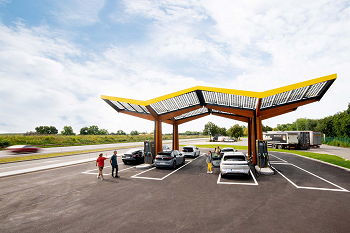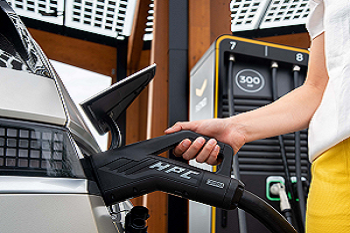Fastned aims to accelerate the transition to electric mobility with its ultra-fast charging facilities
Fastned is one of the pioneers of ultra-fast charging stations for electric vehicles in Europe, with a track record of 12 years. These infrastructure facilities, commonly known as electric charging stations, are essential for accelerating the transition to electric cars, with a charging capacity that allows a range of up to 300 kilometres to be recovered in just 15 minutes.
After its recent arrival in Spain, Inma Cima, the company’s Country Manager, talked to us about its next objectives. In Europe, the Dutch company wants to roll out a network of 1,000 ultra-fast charging stations. Today, it has already exceeded 300 in the seven countries where it has now set up its own charging stations. And in Spain, the first will be put into operation in the Community of Madrid, with eight charging points of up to four hundred kilowatts each.


Spain is Fastned's ninth country of operation. Can you give us a preview of what you plan to do?
We have just signed a contract to build our first ultra-fast charging station in Spain, located in Casarrubuelos, a municipality in Madrid on the busy A42 motorway that connects Madrid with Toledo. The station will have eight chargers, each with an output of up to 400 kilowatts, and where hundreds of electric vehicle drivers will be able to recharge their batteries every day. And we are currently working on eight other projects that will provide our roads with ultra-fast charging infrastructure.
In Spain, the charging infrastructure is still limited, even more so when it comes to ultra-fast charging. What are your objectives?
At Fastned, we are committed to investing now to provide electric vehicle drivers with reliable, high-quality and ultra-fast infrastructure. We have been doing so for 12 years, and our network of charging stations has been recognised with numerous awards. Our aim is to accelerate the transition to electric vehicles, enabling drivers to charge their EVs in the shortest possible time, easily, safely and in a very welcoming environment. Our goal is for Spain to become an important part of our infrastructure network and for us to have 1,000 charging stations in Europe.
What impact will the new European legislation have on the deployment of charging stations in Spain?
By 2025, Europe's major motorways should have at least one 400kW charging point every 60 kilometres. This forces Member States to greatly accelerate the expansion of charging points in order to comply with the regulations and thus advance the deployment of electric vehicles. Facing up to these new regulations means that Spain and other European countries have to urgently and definitively address the transition to electric mobility.
Your stations are sustainable, scalable and stand out for their design. What do these factors bring to the business?
At Fastned, we are focused on providing excellent service to our users, and this is conveyed in every element of our stations. All the energy we use comes from 100% renewable sources, reaffirming our commitment to the environment. Our iconic yellow canopies with solar panels also allow us to harness the energy generated while providing protection for our users. In order to make the process as easy as possible for drivers, we designed the stations with a “drive-thru” system where users stop, charge and go on their way, without the need to queue. In addition, the chargers themselves are also designed with the same objective in mind: to facilitate the charging process for the user. This is why they have built-in credit card payment systems without the need for prior registration. It is quite common for drivers to have to register before using a charging point at other electric charging stations, something which diminishes the user experience. Fastned also goes one step further by designing our stations to be fully accessible for people with reduced mobility so that they can move around and charge their electric car freely. In general, we are very focussed on being sustainable and using as many sustainable materials as possible for the stations.
You bring a track record of success, with over 300 charging stations in operation across seven countries. How will this experience be reflected in Spain?
We are a company that was founded in 2012 in Amsterdam and have been a pioneer in the industry throughout Europe, and we remain so thanks to our charging concept. This experience allows us to launch in Spain with many lessons already learned and with a know-how that can be applied to the country’s specific requirements. We have been very well received by both the industry and the public administration, and we will help in any way we can to accelerate this transition to electric mobility.
How important is Spain for the company's strategy?
Spain is the natural extension of Fastned's existing European network of charging stations: connecting drivers from England, the Netherlands, Belgium, Denmark, France, Germany, Switzerland and Italy to the country. In addition, Spain is one of the countries with the largest car fleet in Europe and, in terms of length of motorways and dual carriageways, it is the leader in Europe with 15,000 kilometres. All this makes Spain a very attractive and important country for our network.
How many employees do you have in Spain and how will this figure evolve?
We are currently a team of eight people, including engineers, architects and expansion experts, and we expect to expand the team before the end of the year. We are in an industry that is growing exponentially, and so are our teams, which might double year on year.
What is your budget and timeframe for investing in Spain?
We do not have a set budget. Having been operating for over ten years and having been pioneers in the industry has allowed us to set up stations that are already very profitable and that enable us to continue investing in new stations and new markets yet to be developed.
Your stations can serve hundreds of cars a day. Will their presence accelerate the sale of electric vehicles?
The answer is yes. What is currently holding people back from buying an electric car is the price and the lack of infrastructure. In terms of price, there are more and more electric models on the market and the Government of Spain is continuing to provide subsidies to help consumers purchase electric cars. While there are many chargers in place, in terms of infrastructure the percentage of ultra-fast chargers is still small. That is why our presence with ultra-fast charging stations will help drivers to switch to electric mobility. There is a need for a powerful, homogenous charging infrastructure that reaches all citizens, wherever they are. These aspects mean that we can play a key role in the challenge of providing Spain with the necessary charging infrastructure.
Photos: Fastned



